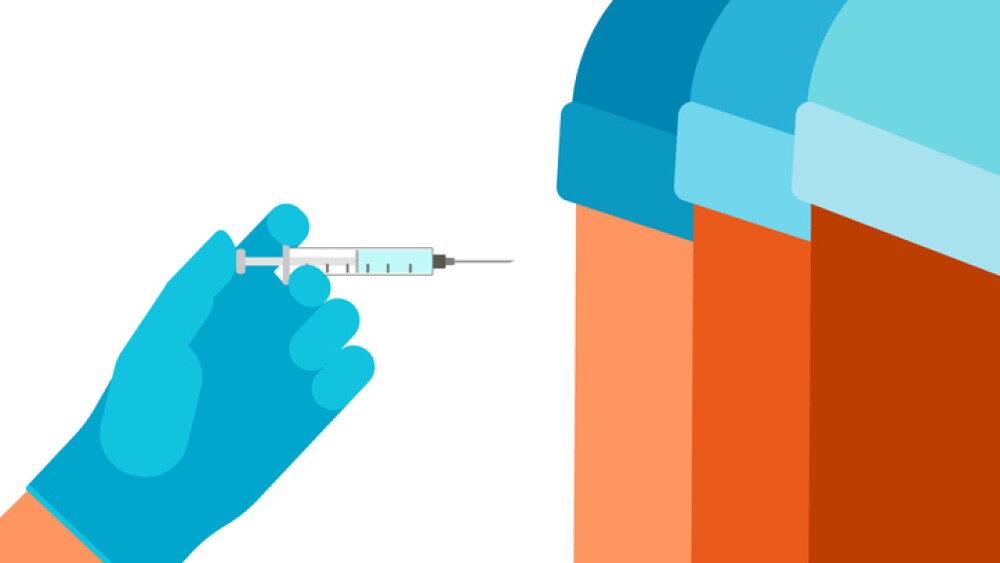CAMBRIDGE, Mass.--(BUSINESS WIRE)--Moderna Therapeutics, a pioneer in the development of messenger RNA (mRNA) Therapeutics™, today announced it is now a clinical stage company with its first Phase I study for mRNA 1440 currently underway in Europe. Moderna also announced it has filed an investigational new drug (IND) application with the U.S. Food and Drug Administration (FDA) for mRNA 1851, its second clinical program, with a Phase I study anticipated to begin in Q1 2016. mRNA 1440 and mRNA 1851 are infectious disease vaccines for undisclosed targets and indications. Moderna’s Chief Executive Officer, Stéphane Bancel, made the announcement during a presentation today at the J.P. Morgan 34th Annual Healthcare Conference in San Francisco, Calif. Mr. Bancel highlighted the company’s broad accomplishments in 2015 and outlined key focus areas for 2016.
“2015 was a year of tremendous growth and progress for Moderna. With the introduction of three new ventures and the advancement of key external collaborations, we have established a unique infrastructure that is enabling us to amass a pipeline that covers an unprecedented number of drug modalities and therapeutic targets”
“2015 was a year of tremendous growth and progress for Moderna. With the introduction of three new ventures and the advancement of key external collaborations, we have established a unique infrastructure that is enabling us to amass a pipeline that covers an unprecedented number of drug modalities and therapeutic targets,” said Stéphane Bancel, CEO of Moderna. “Advancing to the clinic certainly was the most gratifying milestone. We are now a major step closer to delivering on the promise of transformative mRNA science to bring breakthrough medicines to patients across a vast array of diseases, including infectious diseases, rare diseases, cancer and cardiovascular diseases, among others. I am deeply grateful to our wonderful team who has made all of these successes happen.”
2015 and Recent Highlights
Expansion of the Moderna Ecosystem
In 2015, Moderna executed on its strategic plan to rapidly expand its ecosystem, which allows for simultaneous progression of both internal development programs as well as programs through key external partnerships. Highlights included:
- Launching three new therapeutic area-focused ventures: Valera, focused on infectious diseases; Elpidera, focused on rare diseases; and Caperna, focused on personalized cancer vaccines. The new ventures joined Onkaido, the company’s first venture focused on oncology, which launched in 2014.
- Announcing a three-year license and collaboration agreement with Merck to develop messenger mRNA-based antiviral vaccines and passive immunity therapies for four undisclosed viruses. Merck is expected to enter the clinic with its first mRNA Therapeutics program in 2016.
- Accelerating ongoing relationship with existing partners AstraZeneca and Alexion to advance mRNA research programs for cardiovascular and rare diseases, respectively, with both companies expected to be in position to advance their first mRNA Therapeutics programs to the clinic in 2016.
- Extending existing grant from the Defense Advanced Research Projects Agency (DARPA) to finance preclinical toxicology studies and the Phase I study of mRNA 1388 expected to begin in 2016. This extension builds on the original grant announced in 2013 to develop antibody-producing drugs to protect against a wide range of known and unknown emerging infectious diseases and engineered biological threats.
Moderna announced today a new collaboration with AstraZeneca to discover, co-develop and co-commercialize immuno-oncology mRNA therapeutic candidates. The collaboration is in addition to the exclusive agreement announced by the companies in 2013 to develop mRNA Therapeutics for the treatment of cardiovascular, metabolic and renal diseases as well as selected targets in oncology.
Moderna also announced today that Merck has licensed a vaccine program against an undisclosed viral target, including mRNA 1566 and a set of related novel vaccine candidates, as part of the ongoing collaboration between the companies. The inclusion of this new program, which was not part of the original collaboration agreement, follows the rapid progress made in the first year of the collaboration.
Becoming a Clinical Stage Company
In 2015, Moderna became a clinical stage company with the initiation of its first Phase I study for mRNA 1440 and submission of a regulatory filing for a second clinical program, mRNA 1851. Highlights included:
- Initiating first clinical trial; 12 healthy volunteers already dosed in ongoing Phase I study for mRNA 1440.
- Filing an IND with the U.S. FDA to advance a second program, mRNA 1851, to the clinic, with the Phase 1 study anticipated to begin in Q1 2016.
To support its evolution as a clinical stage company, in January 2016, Moderna announced a strategic collaboration with Pharmaceutical Products Development, LLC (PPD). PPD’s support will include investigational new drug (IND) strategic planning, as well as clinical trial design and execution.
Robust Financial Position Enabled by Landmark Funding
In 2015, Moderna announced $500 million in new equity financing to support the expansion of its platform and pipeline. Since the company’s founding in 2011 by Flagship VentureLabs™, Moderna has secured $1.2 billion in funding through financing activities and commercial partnerships. Additional highlights included:
- Starting and ending the year with approximately $800 million of cash, while investing approximately $175 million to build Moderna’s business.
Growth of Internal Expertise and Infrastructure
To help guide its rapid evolution as a clinical stage company, Moderna made key additions to its senior leadership team and Board of Directors, significantly grew its employee base and enhanced its infrastructure and capabilities in 2015. Highlights included:
- Appointing to its board of directors, Elizabeth (Betsy) Nabel, M.D., President of Harvard-affiliated Brigham and Women’s Health Care.
- Appointing Tal Zaks, M.D., former Senior Vice President and Head of Sanofi Global Oncology, as Moderna’s Chief Medical Officer.
- Appointing Marcello Damiami, technology and life sciences sectors IT expert from Motorola and bioMerieux, as Chief Digital Officer.
- Appointing Jeff Hrkach, formerly Chief Technology Officer of BIND Therapeutics, as Head of Delivery Innovation.
- Expanding headcount from 192 to 326 team members.
- Signing a lease at 500 Technology Square in Cambridge, Mass., to accommodate the company’s research and development expansion, which will bring Moderna’s total footprint in Cambridge to more than 170,000 square feet this year.
2016 Business Objectives: Sustained, Cross-Ecosystem Growth Trajectory
Mr. Bancel mapped out key areas of focus for Moderna in the year ahead as the company continues to progress as a clinical stage, patient-facing enterprise, including:
- Moving several more drugs into the clinic in 2016 across both internal and external development programs in various therapeutic areas of high unmet need.
- Advancing several additional discovery programs to start preclinical toxicology studies in 2016, with the aim of initiating clinical studies in 2017.
- Building a high-quality, scalable clinical development engine to match the accelerated output of Moderna’s mRNA research, enabling multiple drugs to enter the clinic and be studied in clinical trials in parallel, over the next 24 months.
- Investing approximately $350 million in Moderna’s venture programs as well as its core mRNA platform to continue to build the industry’s leading mRNA operating system.
- Growing Moderna’s team to 500 members by end of 2016.
“It’s remarkable to consider all that we have been able to accomplish since the company’s inception just over four years ago,” said Mr. Bancel. “Our success to date speaks to the validity and superiority of our novel mRNA approach, the vision and dedication of our team and the continued support and commitment of our partners and investors. I believe this trajectory will define Moderna in 2016 and for many years to come.”
About Moderna Therapeutics
Moderna is a clinical stage pioneer of messenger RNA Therapeutics™, an entirely new in vivo drug technology that produces human proteins, antibodies and entirely novel protein constructs inside patient cells, which are in turn secreted or active intracellularly. This breakthrough platform addresses currently undruggable targets and offers a superior alternative to existing drug modalities for a wide range of diseases and conditions. Moderna is developing and plans to commercialize its innovative mRNA drugs through its own ventures and its strategic relationships with established pharmaceutical and biotech companies. Its current ventures are: Onkaido, focused on oncology, Valera, focused on infectious diseases, Elpidera, focused on rare diseases, and Caperna, focused on personalized cancer vaccines. Cambridge-based Moderna is privately held and currently has strategic agreements with AstraZeneca, Alexion Pharmaceuticals, and Merck. www.modernatx.com.
Feinstein Kean Healthcare
Liz Melone, 617-256-6622
liz.melone@fkhealth.com




